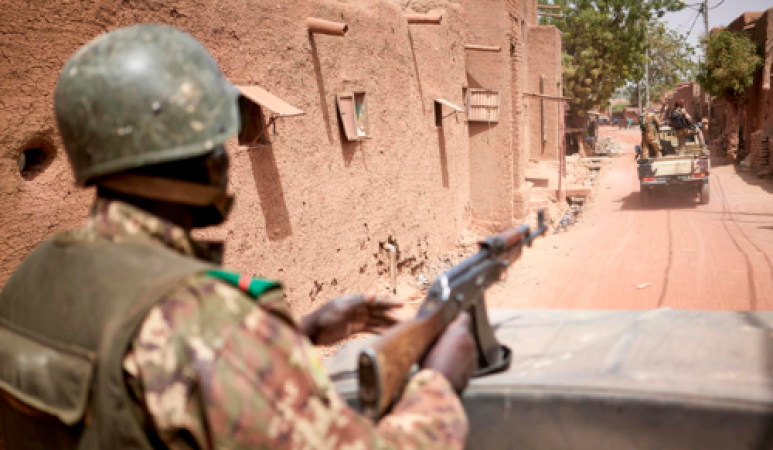
UNO: UN Commences Unprecedented Withdrawal of Peacekeepers from Mali Amidst Complex Challenges
In a historic move with far-reaching ramifications, the United Nations (UN) is embarking on an extraordinary six-month withdrawal of its peacekeeping forces from Mali, as directed by the country's military junta. The decision comes in the midst of Mali's collaboration with Russia's Wagner Group mercenaries to combat a persistent Islamic insurgency. UN Secretary-General António Guterres has labeled this withdrawal as "unprecedented," outlining the multifaceted challenges involved.
UN Special Envoy for Mali, El-Ghassim Wane, presented the ambitious undertaking to the UN Security Council, highlighting the extensive scope of the operation. All 12,947 UN peacekeepers and police personnel must return to their home countries, and the 12 camps and one temporary base that they occupied are to be handed over to the Malian government. Moreover, 1,786 civilian staff members are slated for termination by the stipulated deadline of December 31.
Also Read: EU Border Nations Issue Ultimatum to Belarus Over Wagner Group Presence and Migration Surge
While Mali's UN Ambassador Issa Konfourou affirmed the government's cooperation with the UN peacekeeping mission, also known as MINUSMA, he asserted that the deadline would not be extended. Additionally, the UN faces the complex task of relocating approximately 5,500 sea containers of equipment and 4,000 vehicles belonging to both the UN and the contributing nations. MINUSMA, ranking as the fourth largest of the UN's twelve peacekeeping operations, necessitates an intricate logistical operation for its successful withdrawal.
This intricate process is set to unfold during a "liquidation" phase commencing on January 1, 2024, spanning 18 months. Throughout this period, the UN will maintain police presence in three pivotal hubs—Bamako, Gao, and Timbuktu—where equipment is aggregated. Mali has experienced tumultuous times since a 2012 military coup, followed by the emergence of rebels in the northern region aligning with Daesh (ISIS). Despite efforts to quell their influence, extremist rebels expanded their activities to more populous central areas of Mali in 2015 and have sustained their presence.
In a subsequent coup in August 2020, Mali's president was ousted, leading to a subsequent coup orchestrated by an army colonel who subsequently assumed the presidency in June 2021. The new leader established connections with Russia's military, including the Wagner Group, which made headlines recently due to the reported death of its leader, Yevgeny Prigozhin, in a plane crash.
Also Read: US to maintain'many years' of 'illegal' occupation in Syria
The UN deployed peacekeepers to Mali in 2013, and MINUSMA's mission has become one of the world's most dangerous UN operations, experiencing over 300 personnel casualties. In a comprehensive letter to Security Council members, Guterres underlined the distinctive challenges associated with this withdrawal. The sprawling landscape, hostile operational zones, and climate factors render the mission's six-month timeline remarkably demanding.
Guterres noted that logistical movements of troops and equipment are further impeded by the presence of "terrorist armed groups" and Niger's recent military takeover, given Niger's strategic role as a transit country. UN experts reported a concerning escalation in Islamic State extremist-controlled territory in Mali, almost doubling in less than a year. These developments have also allowed Al-Qaeda-linked groups to capitalize on the situation and perceived vulnerabilities of armed groups that endorsed a 2015 peace agreement.
El-Ghassim Wane revealed the withdrawal's phased approach, initially targeting the closure of smaller, more remote outposts. This phase concluded on August 25, with the Ber, Goundam, Menaka, and Ogossagou temporary base successfully vacated. However, the Ber withdrawal was expedited due to clashes at the camp, leading to attacks on UN convoys departing the area.
These clashes, which involved Wagner mercenaries, as claimed by France's Deputy UN Ambassador Nathalie Broadhurst, raised concerns of cease-fire violations and threatened the 2015 peace agreement. US Ambassador Linda Thomas-Greenfield also voiced apprehension about the resurgence of hostilities, particularly at the Ber location. She pointed out that MINUSMA's withdrawal could hinder the international community's ability to shield civilians from the actions of groups like Wagner, which contribute to heightened insecurity in Mali.
Russia's Deputy UN Ambassador Dmitry Polyansky underscored Russia's commitment to providing assistance to Mali and other African partners on an equitable basis, though he made no specific mention of the Wagner Group.
As the second phase of troop withdrawal commences on September 1, Wane emphasized its formidable challenges due to the substantial distances that convoys evacuating troops and equipment must traverse, including through hostile regions. This phase reflects the broader context of a paralyzed 2015 peace agreement, pivotal for Mali's long-term stability.
Also Read: Burning Man Eco-Warriors Arrested by US Park Rangers in Fiery Standoff
In the complex arena of geopolitics, security, and human rights, the UN's withdrawal from Mali presents intricate challenges. It underscores the necessity for measured decisions that consider not only geopolitical considerations but also the protection of civilian lives and the broader implications of military actions. The withdrawal from Mali will serve as a test case for the international community's capacity to navigate such complexities while upholding core principles and safeguarding regional stability.